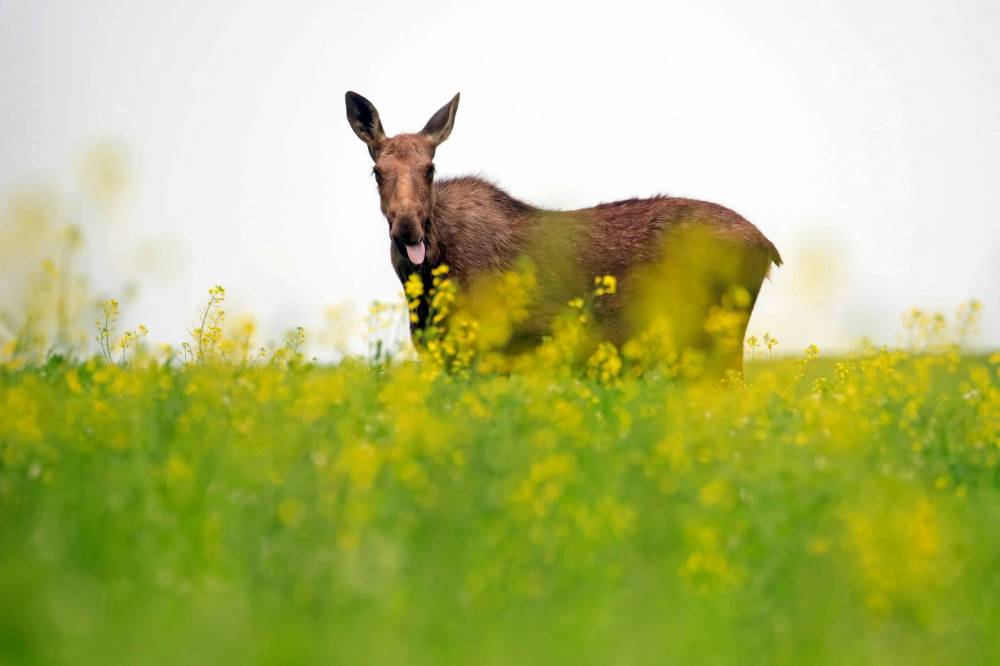The Manitoba Wildlife Federation is taking legal action after the province reduced the number of moose-hunting licences available to non-Indigenous applicants in some northern areas.
The federation filed a notice of application for judicial review in Court of King’s Bench Monday, asking for a judge to review the government’s decision to issue a maximum of 100 licences for moose hunting in four northern game areas after first indicating 400 licences would be available this fall.
The 15,000-member conservation group, which represents hunters and their interests, is seeking a declaration that the government’s decision was unlawful and for the court to order Natural Resources Minister Jamie Moses to issue licences to unsuccessful applicants.

BRANDON SUN FILES
The Manitoba Wildlife Federation is taking legal action over provincial limits on non-Indigenous moose-hunting licences.
“MWF alleges that the decision was unfair, unreasonable and made in bad faith,” reads the court filing.
Earlier this summer, the MWF accused the NDP government of taking direction from political advocacy organizations including Manitoba Keewatinowi Okimakanak, which represents 26 northern First Nations, rather than making the decision based on data, studies or aerial surveys.
MKO met with Moses on June 17 to ask that hunting be off-limits to non-Indigenous people in their First Nation territories, where they claim moose — an important food source for Indigenous communities — appear to be in decline.
MKO requested cancellation of the upcoming moose tag draw on June 21, arguing that issuing licences would violate First Nations hunting rights and threaten the moose population.
The government informed non-Indigenous moose tag applicants on June 21 that the draw was delayed, without further explanation, the MWF alleged in its court filing.
On July 11, the province announced it would issue 50 bull moose tags in the affected game areas, saying the decision to reduce the number of licences is in order to “balance population sustainability and the needs of harvesters while still offering hunting opportunities.”
The MWF threatened legal action shortly after.
After 200 moose tags were issued in the four areas last year, 47 animals were reported harvested, a government spokesman said at the time.
Misipawistik Cree Nation Chief Heidi Cook said the government’s decision — which she and other First Nations leaders took as a compromise — should be upheld in court.
Cook said her community, which is on the northwest edge of Lake Winnipeg adjacent to the southernmost licensed game hunting area, has noted a decline in the moose population and has not been able to meet its food needs as a result.
“I can understand (the MWF is) upset because they’re not allowed to continue hunting in the way they usually have,” said Cook. “(But) I think it was a good move on the part of the province. We’ve been pushing for this for at least 10 years.”
She said treaty hunting rights are being violated by mismanagement.
“It’s a step in the right direction,” she said. “We need to make sure that the moose population is stabilized first.”
A provincial government spokesman said Tuesday the justice department has been served with the notice of application and officials are now reviewing it.
A spokesman for the natural resources minister did not return a request for comment.
erik.pindera@freepress.mb.ca

Erik Pindera
Reporter
Erik Pindera is a reporter for the Free Press, mostly focusing on crime and justice. The born-and-bred Winnipegger attended Red River College Polytechnic, wrote for the community newspaper in Kenora, Ont. and reported on television and radio in Winnipeg before joining the Free Press in 2020. Read more about Erik.
Every piece of reporting Erik produces is reviewed by an editing team before it is posted online or published in print — part of the Free Press‘s tradition, since 1872, of producing reliable independent journalism. Read more about Free Press’s history and mandate, and learn how our newsroom operates.
Our newsroom depends on a growing audience of readers to power our journalism. If you are not a paid reader, please consider becoming a subscriber.
Our newsroom depends on its audience of readers to power our journalism. Thank you for your support.